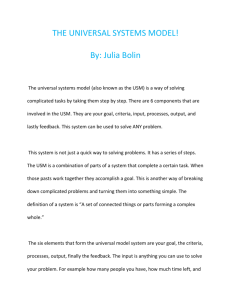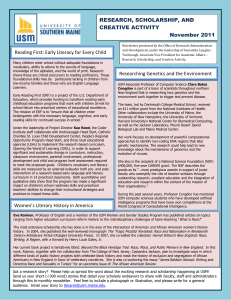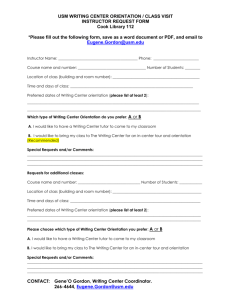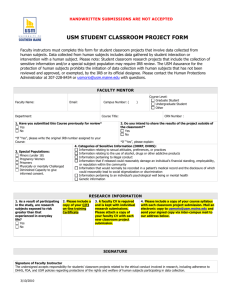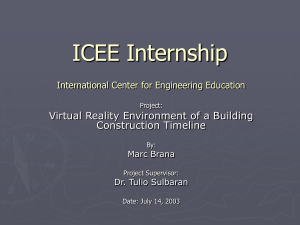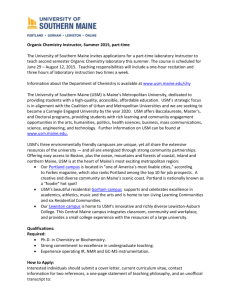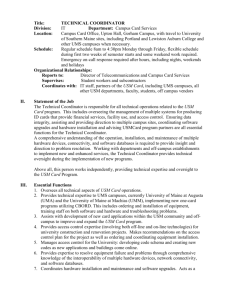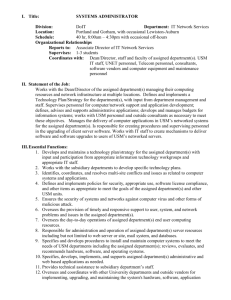Document 12158392
advertisement
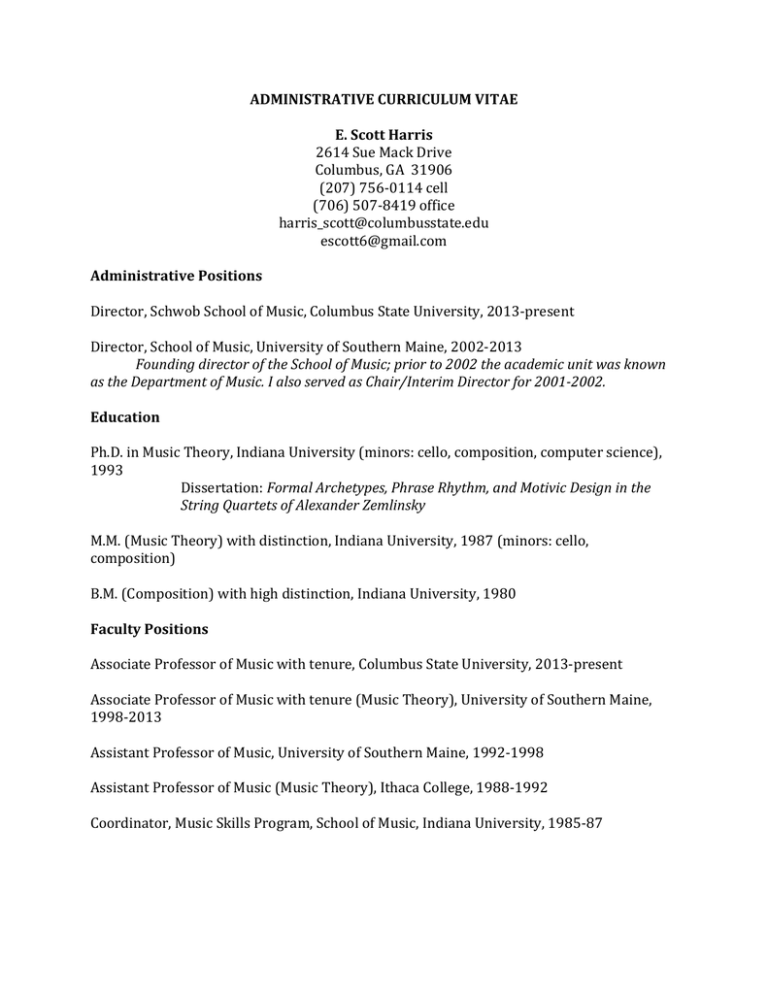
ADMINISTRATIVE CURRICULUM VITAE E. Scott Harris 2614 Sue Mack Drive Columbus, GA 31906 (207) 756-­‐0114 cell (706) 507-­‐8419 office harris_scott@columbusstate.edu escott6@gmail.com Administrative Positions Director, Schwob School of Music, Columbus State University, 2013-­‐present Director, School of Music, University of Southern Maine, 2002-­‐2013 Founding director of the School of Music; prior to 2002 the academic unit was known as the Department of Music. I also served as Chair/Interim Director for 2001-­‐2002. Education Ph.D. in Music Theory, Indiana University (minors: cello, composition, computer science), 1993 Dissertation: Formal Archetypes, Phrase Rhythm, and Motivic Design in the String Quartets of Alexander Zemlinsky M.M. (Music Theory) with distinction, Indiana University, 1987 (minors: cello, composition) B.M. (Composition) with high distinction, Indiana University, 1980 Faculty Positions Associate Professor of Music with tenure, Columbus State University, 2013-­‐present Associate Professor of Music with tenure (Music Theory), University of Southern Maine, 1998-­‐2013 Assistant Professor of Music, University of Southern Maine, 1992-­‐1998 Assistant Professor of Music (Music Theory), Ithaca College, 1988-­‐1992 Coordinator, Music Skills Program, School of Music, Indiana University, 1985-­‐87 E. Scott Harris Administrative Experience I. Academic and Program-­‐Related [CSU] Led planning for and saw through USG Board approval a substantive change in curricula for the Bachelor of Music in Performance and Bachelor of Music in Music Education degree programs. To be implemented Fall, 2015. [CSU] Led Schwob SOM representation at the Georgia Music Educators Association Annual Conference, Savannah, GA, January, 2014, and January, 2015. [CSU] Secured approval of the 2013-­‐17 Strategic Plan for the Schwob SOM, February, 2014. [CSU] Featured presentation on Schwob SOM, University System of Georgia Board of Regents, Atlanta, GA, November, 2013. [CSU] Developed and implemented a new performance calendar system for the school, 2013. [CSU] Hired an Assistant Professor, a Visiting Assistant Professor, a Lecturer, a staff Collaborative Pianist, and numerous new part-­‐time faculty. [USM] Planned and implemented a new graduate program consisting of five degree plans: Master of Music in Composition, Master of Music in Conducting, Master of Music in Jazz Studies, Master of Music in Music Education, Master of Music in Performance. Full and final approval achieved in 2003. [USM] Coordinated revisions in every undergraduate music degree plan, leading to a renewed curriculum that emphasizes new relation-­‐points between major studies and general education, increases K-­‐12 classroom experience in music education, and individualizes music history requirements to align better with areas of specialization in performance majors. Fully implemented in 2011. [USM] Led music faculty through multiple levels of participation over several years as we worked in concert with faculty across the university to develop USM’s new general education requirements. The School of Music designed new courses for every level of the new general education curriculum. A course created specifically for music majors, Musician’s Health, is among the innovative interdisciplinary entry-­‐year experience courses being offered. It is taught by faculty members from music and sports medicine. I met for more than a year with a planning group from the College of Arts and Sciences to assist in tying conceptual frameworks to the nuts-­‐and-­‐bolts of how students navigate through curricular choices. 2 E. Scott Harris [USM] Led music faculty participation in development and refinement of the USM Strategic Plan. Plan completed in 2011; the School of Music was identified as a core area of academic strength. [USM] Guided the School of Music’s responses to USM Reorganization, 2009-­‐2011. [USM] Coordinated a major renovation project for Corthell Hall. Achieved a renovation of the 131-­‐year-­‐old building so that it was fully dedicated to music, including the renovation of key spaces for new classrooms, rehearsal halls, and practice rooms. This was the culmination of nearly a decade of planning. We achieved a renovation that was cost-­‐effective and improved teaching and learning in significant ways. [USM] Established the Center for Music Technology, 1996. The lab was funded by a grant of $50,000 from the Davis Family Foundation. [USM] Developed and implemented the School of Music Spotlight Series, 2005. The series began in 2006 and continues to thrive. Some of the notable concerts we have produced through this initiative include: The Complete Brandenburg Concertos (Fall, 2006); repeated in Rockport, ME School of Music 50th Anniversary Celebration Concert (Spring, 2007) Monteverdi’s Orfeo in Concert, a performance in celebration of the 400th anniversary of the first great opera (Fall, 2007); repeated by invitation at Bowdoin College, Brunswick, ME The Eight Seasons: Vivaldi and Piazzolla (Fall, 2008); concert repeated at Stone Mountain Arts Center, Brownfield, ME. Haydn’s Creation (Spring 2010); repeated by invitation in Wolfeboro, NH Bach’s B-­‐Minor Mass (Fall, 2010); repeated by invitation at Bowdoin College, Brunswick, ME Mahler, Symphony No. 3 (Fall, 2012); a performance in celebration of the 70th Anniversary of the Portland Youth Symphony Orchestra [USM] Hired six tenure-­‐track faculty members, five fixed-­‐length faculty, and fourteen part-­‐time and artist faculty members. [USM] Initiated an undergraduate major in musical theatre, in collaboration with the Department of Theatre. The major (Bachelor of Music in Performance—Musical Theatre) has rapidly grown to be USM’s most selective undergraduate music program. [USM] Achieved Ten-­‐Year Reaccreditation by the National Association of Schools of Music (2002); Led the self-­‐study process and served as primary author for the Reaccreditation Self-­‐Study in 2012. The site visit occurred in April, 2013. [USM] Expanded the Visiting Artist Series to include multi-­‐day residencies. In 2013 the Da Capo Chamber Players was in residence for four days. 3 E. Scott Harris II. Development and Fund-­‐Raising [CSU] Cultivated and announced the multi-­‐million dollar endowment of the Jack and JoRhee Pezold Division of Keboard Studies, Fall, 2014. [CSU] Cultivation of on-­‐going giving which resulted in the donation of a Yamaha Disklavier ($124,000) and other musical instruments including a new Lyon and Healy Harp ($30,000). [USM] Annual Fund (including corporate and private concert sponsorships) and endowment gifts for music, primarily for music scholarships and operating support, have increased dramatically, totaling more than $1,000,000 over six years, 2006-­‐ 2012. [USM] A feasibility study prepared for the university by the firm Jerold Panas, Linzy & Partners, which proposed new and renovated facilities for the School of Music, was presented in November, 2010, included the following “bullet-­‐point” conclusion: “The School of Music is Beloved.” The conclusions of the study advanced a visionary plan for the School of Music involving a new facility and a capital campaign. [USM] A pledge for a lead gift of $3,000,000 was secured (2012). [USM] In-­‐kind gifts to the music program with a value in excess of $200,000 were donated between 2004 and 2012. Gifts included collections of musical instruments, audio recording equipment, opera costumes, and musical scores and books. [USM] Wrote numerous funded grant requests totaling more than $100,000. [USM] Featured presentations about the School of Music at the invitation of the president to: USM Board of Visitors, September 18, 2009 USM Corporate Partners, October 14, 2009 USM Foundation Board, December 17, 2009 [USM] The Music Advisory Council was restructured and renamed the Friends of Music Advisory Board; it developed into a strong advocate for the school, with representation from many facets of community leadership. I met with the board several times a year. It was recognized across campus as one of the most active and effective advisory boards at USM. [USM] The annual Holiday Gala fund-­‐raising event for music scholarships raised between $50,000 and $65,000 each year of my tenure. 4 E. Scott Harris III. Community Engagement [CSU] Schwob School of Music Preparatory Division. Classes and lessons offered for pre-­‐college musicians. Converted from a revenue-­‐losing to a revenue-­‐generating division under my leadership. [CSU] Spoke at the Georgia Department of Economic Development Board of Directors meeting about the Schwob School of Music, May 22, 2014. [CSU] Developed collaborative agreements with a range of internal and external partners, including: Carson McCullers Center for Writers and Musicians (CSU) Voices of the Valley Board of Directors (Columbus community) Spivey Hall Educational Concert Series (University of Georgia System) Atlanta Symphony Youth Orchestra (external) [USM] Youth Ensembles Program Portland Youth Symphony Orchestra Portland Youth Wind Ensemble Portland Youth Junior Orchestra Portland Young People’s String Consort Southern Maine Children’s Choir The USM School of Music administered Maine’s premiere performing arts organization for middle school and high school musicians, with more than 250 student participants every year. I served as administrative director of this program. [USM] Summer Music Academies. Four summer camps for pre-­‐college students presented each summer. [USM] Community Outreach Performances—the School of Music made community engagement a top priority under my leadership. Program books for major concerts include a two-­‐page spread entitled “USM School of Music and the Community,” which details our connections throughout southern Maine and beyond. [USM] Portland Symphony Orchestra (PSO); Member, Music Director Search Committee, 2005-­‐2007 [USM] Host for Musically Speaking, sponsored by the Portland Public Library and the PSO, 2005-­‐2008; [also numerous pre-­‐concert lectures, 2008-­‐2013] [USM] PSO Board of Trustees, 2007-­‐2013. From 2009-­‐2012 I served as Vice-­‐President for Education and Chair of the Education Committee, and led the education portion of the orchestra’s strategic planning process. The orchestra and the School of Music have a long and mutually beneficial partnership. 5 E. Scott Harris [USM] Collaboration with Portland Ovations on artist master classes and residencies. In recent years we brought artists such as Christine Brewer, soprano, Matt Haimowitz, cello, Kirill Gerstein, piano, and the Borromeo String Quartet to campus for master classes through this partnership. Host institution, All-­‐State Music Conference and Festival, 2003, 2005, 2007, 2009, 2011, 2013 Participant: Summit on Portland’s Creative Economy, May 31, 2006 Blaine House Conference on Maine’s Creative Economy, May 7, 2004 IV. Service, College and University [CSU] Service beyond the unit, as a member of the following committees: CSU Graduate Council CSU Chairs Assembly COA Executive Committee [USM] Service beyond the unit, as a member of the following committees: College of Arts, Humanities, and Social Sciences Budget Committee Advisory Committee to the Dean of the College of Arts and Sciences (CAS) on General Education Revision University-­‐wide Scheduling Committee Advisory Committee to the Dean of CAS on the USM Strategic Plan USM Art Gallery Mission Review Committee USM Honorary Degree Committee CAS College of the Arts Exploratory Committee USM Teacher Education Council CAS Graduate Affairs Committee CAS Dean Search Committee (twice) [USM] Faculty representative: CAS Curriculum Review Committee CAS Faculty Professional Development Committee Self-­‐Designed Major Committee Professional Development V. Practical Architectural and Acoustical Tools for Better Music Facilities, NASM Workshop for Music Executives, November 18-­‐19, 2005 Chairing the Academic Department, A Workshop for Division and Department Chairs and Deans, American Council on Education, Alexandria, VA, June 17-­‐20, 2003 6 E. Scott Harris Professional Activities: Teaching, Scholarship, and Creative Activity List of Courses Taught [CSU] Instrumentation and Transcription, Aural Skills 2, Form and Analysis [USM] Music Theory I, II, III, IV, Music Theory Lab, Sight Singing and Ear Training I, II, III, IV, Form and Analysis, Counterpoint, Advanced Analysis of Tonal Music, Advanced Aural Skills, Strings II, Music Appreciation and History, Music and Multimedia, Graduate Seminar in Music Theory, Seminar in Music History, Topics in Music Technology, Recital Class, Directed Study in Composition, Orchestration, many Independent Studies in Schenkerian Analysis, multiple Independent Studies in Sixteenth-­‐Century Counterpoint, Honors Theses Supervision (2) [USM] Guest composer, Graduate Certificate Program Composing Together, 2008-­‐ present [USM] Developed and taught two new upper-­‐level three-­‐credit courses: Advanced Aural Skills and Advanced Analysis of Tonal Music. These courses were added to the music curriculum (as requirements for performance and liberal arts majors) beginning in 2002. I have taught each course four times. [USM] Developed a comprehensive web site for ear training materials, which now includes more than 2000 files and over 200 separate pages of material. The URL is http://www.usm.maine.edu/~sharris. [USM] Developed, assembled hardware and software for, and taught new courses in music technology entitled Music and Multimedia (1999) and Music Online (2011). Compositions, Performances, Presentations and Publications “Composing Together: Building Bridges between Composers and Music Educators,” Panel participant, College Music Society, Cambridge, MA, November 2, 2013. [Refereed] Spotlight Concert Series, 8 Celli + Soprano—Scott Harris and Friends, season-­‐ opening faculty concert, Gorham, ME, September 25, 2012. featured works included two premieres: Falla, Siete canciones populares españolas, arranged by Scott Harris for soprano and six cellos Harris, Canto, version for six cellos (2012) 7 E. Scott Harris Spotlight Concert Series, Brahms Sextet No. 2 in G Major, Op. 36, season-­‐opening faculty concert, Gorham, ME, September 24, 2009. Celebration Fanfare, revised version, 2007. Merrill Auditorium, Portland, ME, April 27, 2007. USM Concert Band, Peter Martin, conductor. Sinfonia, for piano four hands, Faculty Composers Recital, Gorham, ME, April 13, 2006. Erin Costello and Liz Noonan, piano. Christus natus hodie, for chorus and brass quintet. Premiere performances by the Choral Art Society and the Portland Brass Quintet, Robert Russell, conductor, Christmas at the Cathedral, Portland, ME, December 1-­‐2, 2001 The following works were completed in 2000-­‐2001 and premiered at a Faculty Concert Series concert, March 9, 2001: Sonata for Bassoon and Piano, Ardith Keef, bassoon, and Judith Quimby, piano Subsequent performance in Kiev, Ukraine, 2005 BachStreams (electronic piece) Dances of Ecstasy, Songs of Despair, for Violin, Viola, Double Bass, Flute, Clarinet, Harp, and Percussion, Scott Harris, conductor Waltz Sequence for Horn and Piano, John Boden, horn, and Phillip Silver, piano Subsequent performances: Northeast Horn Workshop, Boston Conservatory of Music, 2002, Boden, horn, and Martin Perry, piano; Julliard School, New York, 2004, Megan Bolton, horn; University of Southern Maine, Sophie Flood, horn, 2009. Love’s Labours for Vocal Quartet and Piano Duo, Ellen Chickering, soprano, Laurie Lemley, alto, Bruce Fithian, tenor, David Kravitz, baritone, Judith Quimby, piano, Phillip Silver, piano; Subsequent performance, excerpts: Graduate Vocal Quartet, Anastasia Antonacos, piano, Bridget Convey, piano, April 17, 2009. “Simple Steps to Interactivity in Multimedia for Music Pedagogy,” Association for Technology in Music Instruction, Joint Annual Meeting of Twelve National Music Societies, Toronto, Canada, November 5, 2000. [Refereed] Little Blues in C, for Cello and Piano, August, 2000, premiered by Scott Harris, cello, and Deanna Ingraham, piano, Gorham, ME, August 12, 2000. Principal cello, Atlantic Chamber Orchestra, Lawrence Golan, music director, 1999-­‐ 2003. Annual concert series in Portland, ME. 8 E. Scott Harris Two Tunes for Shepherd's Pipes and other short works, for Flute, Viola, and Cello, December, 1998; premiered by the Andrea Trio in Durham, NH, December 18, 1998. “A QuickTour through QuickTime: How QT3 Lets You Deliver Music, Sound, and Pictures in a New Way,” College Music Society/Association for Technology in Music Instruction Joint Annual Meeting, San Juan, Puerto Rico, October 24, 1998. [Refereed] Cellist, North Conway Bach Festival, 1998-­‐2000. Annual concert series in August, North Conway, NH. Celebration Fanfare, 1998. Premiere performance at Merrill Auditorium, Portland, ME, March 21, 1998. University of Southern Maine Concert Band, Peter Martin, conductor. Designing Aural Skills Software to Support Classroom Activities: What Does CAI Do Best?,” College Music Society/Association for Technology in Music Instruction Joint Annual Meeting, Cleveland, OH, November 15, 1997. [Refereed] Fantasy—Variations for Cello and Strings, 1997. Premiere performance, Gorham, ME, August 14, 1997. Maine ASTA Faculty Orchestra, Lawrence Golan, conductor, Scott Harris, cello. Cellist, Maine Chamber Ensemble, Peter Frewen, music director, 1997-­‐2001 “Teaching Music Theory Across the Music Curriculum,” Maine Music Educators Association Annual Conference, Orono, ME, May 16, 1997. [Invited] “Gedankenentwicklung, Sonata Form, and the Brahms Tradition in the Music of Alexander Zemlinsky,” Georgia Association of Music Theorists, University of Georgia, Athens, GA, February 22, 1997. [Refereed] “Problems and Possibilities in Treating Sight Singing as the Primary Aural Skill,” Panel Session Presentation: Pedagogical Approaches to Ear Training, Georgia Association of Music Theorists, University of Georgia, Athens, GA, February 21, 1997. [Refereed] “Theory, Intonation, and the Long Line,” Maine ASTA Cello Day workshop for advanced students and teachers, Skowhegan, ME, November 23, 1996. [Invited] 9 E. Scott Harris Musica Vivendi, 1996. [Composition for Brass, Piano, and Percussion] Premiere performance, Gorham, ME, November 1, 1996. Ensemble of faculty, students, and alumni conducted by Scott Harris. Published by Manduca Music, Inc. “Motivic and Thematic Logic in the First Movement of Mahler’s Seventh Symphony,” 1996 Symposium of Research in Music Theory, Indiana University, Bloomington, IN, September 28, 1996. [Refereed] “Motivic and Thematic Logic in the First Movement of Mahler’s Seventh Symphony,” Rocky Mountain Society for Music Theory, University of Arizona, Tucson, AZ, April 19, 1996. [Refereed] “Developing Variation and the Sonata Archetype in Alexander Zemlinsky’s Third String Quartet,” Music Theory Society of New York State, SUNY-­‐Buffalo, Buffalo, NY, April 22, 1995. [Refereed] Founding cellist, Andrea String Trio, 1995-­‐1999, with Juan Fiestas, violin, and Augusto Salazar, viola; performances throughout Maine and New Hampshire CAI materials for Ear Training and Sight Singing. The following programs— Intervals (general drills), Diatonic Intervals-­‐minor, Diatonic Intervals-­‐major, SSET 1 patterns (pitch pattern drills), SSET 4 3-­‐note patterns, SSET 4 5-­‐ note/6-­‐note patterns, Melodic examples for SSET 2, Pitch patterns for SSET 2—are currently available. All the programming, interface design, testing, and documentation were done by the author. The programs were designed to be used without MIDI devices but will also work through a MIDI interface. “Developing Variation, Adorno's Formal Categories, and Tonal Structure in Mahler's Seventh Symphony,” 1-­‐hour presentation, followed by discussion period, Columbia University, New York, NY, July 27, 1994. [Invited] Variations on a French Carol [For viola and cello], 1994. “Phrase Rhythm and Motivic Analysis,” Graduate Theory Seminar, Georgia State University, Atlanta, GA, January 11 & 13, 1993. [Invited] Formal Archetypes, Phrase Rhythm, and Motivic Design in the String Quartets of Alexander Zemlinsky, University Microfilms, Ann Arbor, Michigan, 1993. Guest cellist, Ithaca Violoncello Ensemble concert, Ithaca College, September 29, 1991. “‘The Fun of Admitting Frankly That Drudgery is Drudgery’: Tovey and Hindemith on the Proper Training of Musicians,” College Music Society, Northeast Chapter, Toronto, Canada, April 20, 1990. [Refereed] 10 E. Scott Harris Guest cellist, John Corigiliano Birthday Celebration Concert (with the composer in attendance), Ithaca College, Ithaca, NY, February 16, 1990. Guest cellist, Twelfth International Saxophone Symposium, Fairfax, VA, October 28, 1989. Guest cellist, International Glass Music Festival, Corning, NY, October 14, 1989. “Some Considerations of Style and Form in the Four-­‐Voice Motets of Adriano Willaert,” Music Theory Society of New York State, Baruch College, CUNY, New York, NY, September 23, 1989. [Refereed] Felix-­‐Eberhard von Cube, The Book of the Musical Artwork, translated and edited, with an afterword, by David Neumeyer, George R. Boyd, and Scott Harris, Lewiston, New York: Edwin Mellen Press, 1988. “Orthodox Schenkerism and Twentieth-­‐Century Music: A New Source and a Continuing Controversy, Central Midwest Theory Society, Iowa City, IA, May 1, 1988. [Refereed] Other Activities Inducted into Phi Kappa Phi, national honor society, University of Southern Maine, April 17, 2003. Received a $500 Faculty Technology Grant from the University of Southern Maine, 1999. Participant in the Pierre Boulez Workshop, Carnegie Hall, New York City, NY, November 17-­‐19, 1999. Received a $3,600 stipend from the National Endowment for the Humanities, awarded March, 1994, to attend the seminar "Music and German Modernism," sponsored by Columbia University and the National Endowment for the Humanities, led by Prof. Walter Frisch. June 11-­‐July 30, 1994, Columbia University, NY. Cello master teacher, Maine ASTA (American String Teachers Association) Conference, 1994-­‐1999, including solo performance, daily class instruction of ca. 24 students, chamber music performance, and serving as orchestra principal. 11
